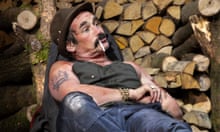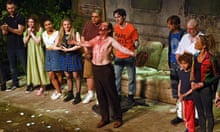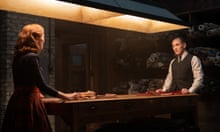A few months ahead of bringing “Rooster” Byron’s band of outsiders back to the stage in a revival of Jez Butterworth’s Jerusalem, Mark Rylance breathes life into a very different kind of anti-establishment figure: Dr Ignaz Semmelweis, a pioneer too ahead of his own time.
Based on an original idea by Rylance and written with Stephen Brown, this play explores the life of the Hungarian doctor who worked in 19th-century Vienna’s maternity wards. Semmelweis’s groundbreaking practices in antiseptic procedure saved thousands of lives – particularly those of impoverished mothers – and might have saved more had his findings been recognised by the medical community. But he was doubted and disbelieved, and died in an asylum without due recognition and, in a final twist of bad fate, of sepsis, from which he had battled to save his patients.
His story becomes a tragedy of almost Shakespearean proportions in the hands of Rylance, who appears plaintive, hollow-eyed, by turns diffident and absolute in his unbending sense of right. But the cast around him keep up, from Thalissa Teixeira as his wife Maria to, as Semmelweis’s medical allies, Jackie Clune, Sandy Grierson, Felix Hayes and Enyi Okoronkwo among others, each as good as the next.
Under the direction of Tom Morris, the production is almost as much a dance as it is a play, with expressionist movement (choreography by Antonia Franceschi) and music (by Adrian Sutton) that take us inside Semmelweis’s mind, from his bursts of anger to his final unravelling. A chorus of ghostly dancers – the women he has been unable to save – enact anguish while violins and the cello weep. These elements together run the risk of an overwrought atmosphere but the production steers clear of that. Instead there is intensity, and the drama feels drawn out in its pain.

It paints a picture of a thwarted life but also, more obliquely, explores why some people are lauded as pioneers, their theories welcomed and their genius immortalised, while others are cast as outsiders. Semmelweis made breakthroughs long before Joseph Lister and Louis Pasteur’s work in germ theory. But in his exacting nature, his single-minded zeal to save lives and his gruff manner, he reveals medical science to be governed by – of course – its own politics of personality when it comes to toppling old paradigms for new.
Two time frames are navigated with magnificent fluidity on Ti Green’s set (spare yet dramatic, an oculus above, a revolve below and an almost eerie blackness from which characters emerge). In these switches of time, we get a keen sense of Semmelweis’s inner fracturing: he seems involuntarily pulled into the past, which is enacted on stage, with his present world simultaneously observing it. Richard Howell’s lighting works within this duality – warm and sepia-tinted in the domestic present but a starkly spotlit past which throngs with shadows in the backdrop.
Death is all around the maternity ward at which Semmelweis works and every loss has an emotional impact, even when it happens in passing. Meanwhile there is a visceral edge to the scenes of autopsies and childbirths, which are gestured in dance or mimed.
Although this is its own specific story, and emphatically a period piece, there is a relevance to the themes of new science and distrust that chimes in our Covid era. The play was conceived before the pandemic but Semmelweis’s pleas for fellow doctors to “wash your hands” makes it feel, uncannily, as if the past is haunting our present too.
Dr Semmelweis is at Bristol Old Vic until 12 February









Comments (…)
Sign in or create your Guardian account to join the discussion